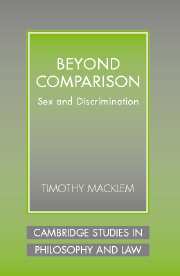5 - The Value of Diversity
Published online by Cambridge University Press: 05 June 2012
Summary
Those who would affirm women's existence as a facet of human difference rely on the suggestion, as I have said, that human beings are complex creatures, who are inevitably betrayed by any attempt to comprehend them in simple terms. I believe there is an element of truth in this suggestion, or perhaps I should say in the intuitions that underlie it, since I have already expressed my belief that the propositions it rests on are false. What truth there is in the suggestion lies in the perception that in some measure at least a failure to acknowledge the distinctive features of women's existence, and the possibility that certain of those features are relevant to our culture, despite the fact that they have been suppressed and concealed by the present social order, may well be a crucial element in the problem of sex discrimination and its remedy. However, when framed in such a manner as to suggest that the suppression of women's existence is but an instance of the suppression of human diversity, so that its remedy is merely a matter of affirming that diversity, the appeal to human complexity and diversity is highly misleading, in three ways. It is misleading, first, because it treats diversity as if it were simply a fact about human existence; second, because it assumes that human differences can be detached from the purposes that make those differences matter to certain people and not to others; and third, because it takes the affirmation of all differences to be a rational and desirable goal when in fact it is neither.
- Type
- Chapter
- Information
- Beyond ComparisonSex and Discrimination, pp. 120 - 134Publisher: Cambridge University PressPrint publication year: 2003



